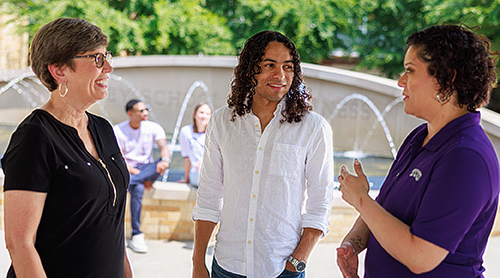When you are accepted to TCU as a business major, you will be assigned a professional academic advisor dedicated to helping students make informed decisions throughout their educational journey while fostering strategies for success. Advising is mandatory for your first four semesters at TCU.
Philosophy
In the Neeley Academic Advising Center, we believe that advising is a collaborative educational process; students and their advisors are partners in meeting the essential learning goals that support student success. The student is responsible for taking the lead and guiding their academic career, while the advisor provides the student with tools, direction and appropriate referrals to assist students in meeting those goals. Advisors assist students with identifying and exploring academic interests and goals, while considering alternatives, to arrive at informed decisions regarding their academic endeavors on the pathway to graduation.
How to Work with Neeley Advisors
Each Neeley student has an assigned academic advisor. Students may find their designated advisor through their my.tcu portal ⇒ Academic Progress ⇒ Advisors
Advising by Appointment: Schedule an individual 30-minute appointment with your advisor to discuss academic goals. Scheduling links are sent to students by their assigned advisor each semester.
Walk-In Advising: 10-15 minute sessions with a Neeley advisor for urgent questions. Each advisor will designate specific walk-in hours throughout each semester. The 1st week of every semester is open walk-ins for all students.
Group Sessions: Attend a group session to gain information on first-year requirements and lower-division business requirements.
Drop-in Peer Advising: Speak with a Neeley Navigator in the Neeley Academic Advising office for quick questions throughout the semester.
Expectations
Advisors will:
- Understand and effectively communicate degree requirements, policies, procedures, and outcomes of academic choices.
- Provide a respectful and confidential space to ask questions and discuss students interests and concerns.
- Assist and encourage students to define and develop realistic educational and personal goals.
- Connect students to campus resources and services.
Students will:
- Communicate honestly and openly with their advisor.
- Come to advising meeting with prepared questions/discussion topics in mind.
- Demonstrate respect for their advisor in all modes of communication.
- Apply knowledge gained from advising to aid in your accountability, commitment, and ownership.
- Ask for help when needed; this is not a weakness, but a strength!
- Accept responsibility for academic decisions and performance.

